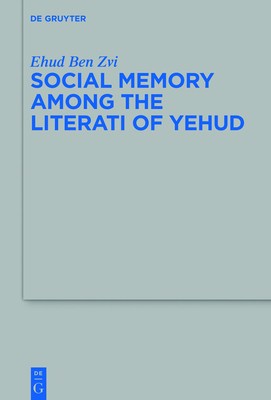
- Išsiųsime per 12–18 d.d.
- Autorius: Ehud Ben Zvi
- Leidėjas: De Gruyter
- ISBN-10: 3110762927
- ISBN-13: 9783110762921
- Formatas: 15.6 x 23.4 x 4.3 cm, minkšti viršeliai
- Kalba: Anglų
- Extra -15 % nuolaida šiai knygai su kodu: ENG15
Atsiliepimai
Aprašymas
Ehud Ben Zvi has been at the forefront of exploring how the study of social memory contributes to our understanding of the intellectual worldof the literati of the early Second Temple period and their textual repertoire. Many of his studies on the matter and several new relevant works are here collected together providing a very useful resource for furthering research and teaching in this area.The essays included here address, inter alia, prophets as sites of memory, kings as sites memory, Jerusalem as a site of memory, a mnemonic system shaped by two interacting 'national' histories, matters of identity and othering as framed and explored via memories, mnemonic metanarratives making sense of the past and serving various didactic purposes and their problems, memories of past and futures events shared by the literati, issues of gender constructions and memory, memories understood by the group as 'counterfactual' and their importance, and, in multiple ways, how and why shared memories served as a (safe) playground for exploring multiple, central ideological issues within the group and of generative grammars governing systemic preferences and dis-preferences for particular memories.
EXTRA 15 % nuolaida su kodu: ENG15
Akcija baigiasi už 3d.16:48:07
Nuolaidos kodas galioja perkant nuo 10 €. Nuolaidos nesumuojamos.

- Autorius: Ehud Ben Zvi
- Leidėjas: De Gruyter
- ISBN-10: 3110762927
- ISBN-13: 9783110762921
- Formatas: 15.6 x 23.4 x 4.3 cm, minkšti viršeliai
- Kalba: Anglų Anglų
Ehud Ben Zvi has been at the forefront of exploring how the study of social memory contributes to our understanding of the intellectual worldof the literati of the early Second Temple period and their textual repertoire. Many of his studies on the matter and several new relevant works are here collected together providing a very useful resource for furthering research and teaching in this area.The essays included here address, inter alia, prophets as sites of memory, kings as sites memory, Jerusalem as a site of memory, a mnemonic system shaped by two interacting 'national' histories, matters of identity and othering as framed and explored via memories, mnemonic metanarratives making sense of the past and serving various didactic purposes and their problems, memories of past and futures events shared by the literati, issues of gender constructions and memory, memories understood by the group as 'counterfactual' and their importance, and, in multiple ways, how and why shared memories served as a (safe) playground for exploring multiple, central ideological issues within the group and of generative grammars governing systemic preferences and dis-preferences for particular memories.


Atsiliepimai